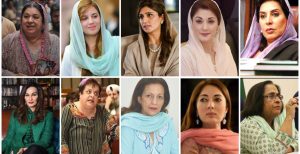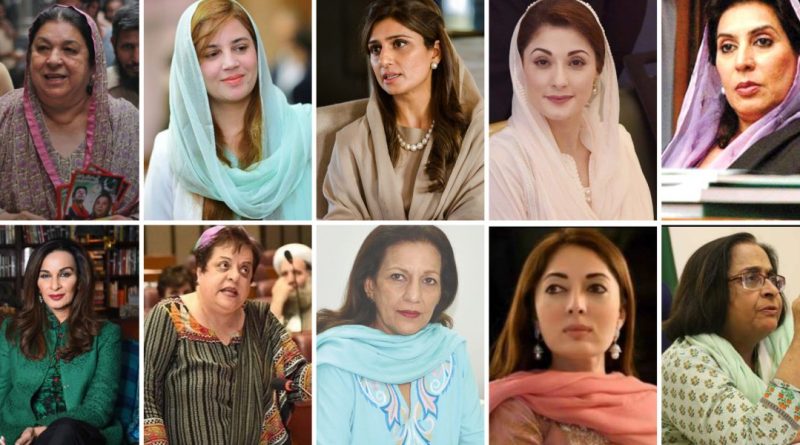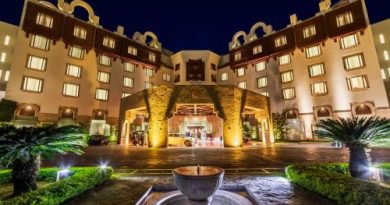Impact of Top 10 Female Politicians on Pakistan’s Society
The diverse landscape of Pakistani politics has produced influential female politicians. From diplomatic prowess to healthcare initiatives, social welfare, and legal and entrepreneurial pursuits, these leaders have played vital roles in shaping the political discourse, contributing to issues ranging from women’s rights to parliamentary affairs. Let’s dig deep into the impactful stories of these dynamic female politicians who have navigated challenges and championed causes.
Top 10 Pakistani Female Politicians
- Benazir Bhutto (Late)
- Kalsoom Nawaz (Late)
- Hina Rabbani Khar
- Sherry Rehman
- Yasmin Rashid
- Firdous Ashiq Awan
- Maryam Nawaz
- Shireen Mazari
- Kashmala Tariq
- Marvi Memon

1- Benazir Bhutto (Late)
Benazir Bhutto, a remarkable leader in Pakistan’s history, was born in 1953 into a prominent political family. Her father, Zulfikar Ali Bhutto, was a former Prime Minister. Benazir’s journey in politics started with her family’s influence, but tragedy struck when her father was executed in 1979.
Despite challenges, Benazir persevered, studying at Harvard and Oxford. She returned to Pakistan, facing imprisonment and accusations. In 1988, after a long period of struggles, she made history as Pakistan’s first female Prime Minister. Benazir aimed to improve healthcare, education, and women’s rights.
Her leadership symbolized courage and progress, challenging traditional norms. However, accusations of corruption and challenges persisted. In 2007, tragedy struck again as Benazir Bhutto was assassinated during an election rally.
Benazir’s legacy endures. She inspired women to enter politics, breaking gender barriers. Her contributions include the Benazir Income Support Program, aiding the less fortunate. Despite controversies, she remains a symbol of empowerment. Benazir Bhutto’s life teaches that women can lead and impact their nations. Her story reflects resilience, marking a significant chapter in Pakistan’s history.
2- Kalsoom Nawaz (Late)
Kalsoom Nawaz, also known as Begum Kalsoom Nawaz, was a Pakistani political figure born on July 3, 1950, in Lahore. She played a significant role in the political landscape of Pakistan, primarily associated with the Pakistan Muslim League (Nawaz Group), PML-N, one of the country’s major political parties.
Kalsoom Nawaz belonged to a distinguished family and married Nawaz Sharif, who later became the Prime Minister of Pakistan. Her political journey gained momentum during the periods when her husband held important political offices. Kalsoom Nawaz actively participated in various social and political activities.
One of her notable achievements was her role as the First Lady of Pakistan during Nawaz Sharif’s term as Prime Minister in the 1990s. She focused on social and health issues and advocated for initiatives to improve the well-being of Pakistani citizens. Kalsoom Nawaz was especially passionate about healthcare and her efforts contributed to establishing medical facilities that aimed to provide quality services to the public.
Beyond her role as the First Lady, Kalsoom Nawaz was recognized for her resilience during challenging times. In the face of political adversity and her husband’s legal battles, she emerged as a symbol of strength for the PML-N supporters. Her ability to handle difficult situations with grace and determination earned her admiration.
However, Kalsoom Nawaz faced personal hardships, including her husband’s periods of political exile and imprisonment. Despite these challenges, she remained a steadfast supporter of her family and the political cause they represented.
Tragically, Kalsoom Nawaz battled cancer during the later years of her life. Her struggle with the disease became a public affair, and her fight against cancer gained sympathy and prayers from people across Pakistan. Kalsoom Nawaz’s passing on September 11, 2018, marked the end of an era in Pakistani politics. Her legacy lives on as a woman who contributed to the social and political fabric of the country.
3- Hina Rabbani Khar
Hina Rabbani Khar, born on November 19, 1977, in Multan, Pakistan, is a notable Pakistani politician who has made significant strides in her political career. Coming from a politically active family, she entered the political arena at a relatively young age.
Hina’s political journey began when she joined the Pakistan People’s Party (PPP), the political party of her family, led by her uncle Ghulam Mustafa Khar. Her early education took place in Multan, and she later pursued her undergraduate studies at Lahore University of Management Sciences (LUMS).
In 2002, Hina Rabbani Khar made her entry into the political mainstream by contesting and winning a seat in the National Assembly of Pakistan. This victory marked the beginning of her formal political career and she continued to rise through the party ranks.
One of Hina’s notable achievements came in 2008 when she was appointed as the State Minister for Economic Affairs. Her role involved dealing with economic matters both at the national and international levels. In 2009, she became the Minister of State for Finance, a position where she played a key role in economic policy-making.
Hina Rabbani Khar gained widespread international recognition when she assumed the position of Pakistan’s Foreign Minister in 2011. At the age of 34, she became the youngest person and the first woman to hold this crucial diplomatic position in Pakistan. Her appointment brought attention not only to her capabilities but also to the changing dynamics in Pakistan’s political landscape.
During her tenure as Foreign Minister, Hina engaged in diplomatic efforts, representing Pakistan on the global stage. She faced challenges related to Pakistan’s relations with some countries, particularly India and the United States. Despite the complexities of the region, her diplomatic approach and communication skills were acknowledged.
Hina’s stint as Foreign Minister concluded in 2013, and she continued to be an active member of the PPP. Over the years, she has maintained a visible presence in Pakistani politics, advocating for socio-economic development and gender equality.
4- Sherry Rehman
Sherry Rehman was born on December 21, 1960, in Karachi, Pakistan. She is one of the prominent figures in Pakistani politics, known for her contributions and achievements. Her journey in politics shows a commitment to social justice, human rights, and progressive ideals.
Sherry Rehman began her career as a journalist, working for various leading publications. Her interest in social issues and politics led her to engage deeply with the challenges faced by Pakistani society. In the early 2000s, she entered active politics, joining the Pakistan People’s Party (PPP).
In 2002, Sherry Rehman became a Member of the National Assembly, representing the PPP. Her role as a parliamentarian allowed her to address critical issues affecting the country. She became known for her advocacy on issues related to women’s rights, human rights, and media freedom.
One of Sherry Rehman’s significant achievements came in 2008 when she was appointed as the Federal Minister for Information and Broadcasting in the government led by then-Prime Minister Yousaf Raza Gillani. In this capacity, she played a crucial role in promoting freedom of expression.
Sherry’s commitment to human rights and democracy was further highlighted in her role as Pakistan’s Ambassador to the United States from 2011 to 2013. As an ambassador, she worked to strengthen diplomatic ties between the two countries and presented Pakistan’s perspective on various global issues.
Throughout her political career, Sherry Rehman has faced challenges, including threats and criticism for her progressive stance. Despite these challenges, she has remained committed to her advocacy for a more inclusive and democratic Pakistan.
Beyond her political roles, Sherry Rehman is also associated with the Jinnah Institute, a think tank focused on promoting democratic values, tolerance, and social justice. Her involvement in such initiatives reflects her commitment to creating a more equitable and progressive society.
5- Yasmin Rashid
Yasmin Rashid is a distinguished Pakistani politician and medical professional who was born on December 3, 1950, in Lahore. Yasmin Rashid started her academic journey by pursuing a medical degree from Fatima Jinnah Medical University, Lahore. She specialized in gynecology and obstetrics and became an important figure in the healthcare sector. Driven by a passion for serving the community, she dedicated herself to providing medical care to women and families.
In the late 1990s, Yasmin Rashid’s involvement in politics began to take shape. She joined the Pakistan Tehreek-e-Insaf (PTI), a political party led by Imran Khan. Her entry into politics marked a new phase in her career where she aimed to address societal issues on a larger scale.
One of Yasmin Rashid’s notable achievements in her political career came during the general elections of 2013 when she contested for a seat in the National Assembly. Although she did not secure victory, her resilience and commitment to public service did not fluctuate. She continued her political journey and focused on the betterment of the healthcare system.
Throughout subsequent years, Yasmin Rashid’s persistence paid off. In the general elections of 2018, she contested for a provincial assembly seat from Lahore and emerged victorious. This win was a significant milestone in her political career, as she became the Provincial Minister for Health in the Punjab cabinet.
Yasmin Rashid’s tenure witnessed initiatives aimed at tackling issues such as maternal and child health, disease prevention, and the overall enhancement of the healthcare system. Her hands-on approach and dedication to public health have been commendable, earning her recognition as a key figure in the PTI government’s efforts to transform the healthcare landscape in Punjab.
6- Firdous Ashiq Awan
Firdous Ashiq Awan was born on January 11, 1970, in Sialkot, Punjab. Her commitment to public service and her active involvement in a variety of political positions have defined her political career.
Firdous Ashiq Awan began her political career in the early 2000s and quickly gained recognition for her contributions to the Pakistan Peoples Party (PPP). Her background in medicine, holding a degree in MBBS, brought a unique perspective to her political endeavors.
In 2008, Firdous Ashiq Awan achieved a significant milestone by becoming a Member of the National Assembly (MNA). She continued to rise within the PPP and was appointed as the Federal Minister for Information and Broadcasting in the government led by Prime Minister Yousaf Raza Gillani. In this role, she worked to communicate government policies and initiatives to the public.
During her time as the Information Minister, Firdous Ashiq Awan worked hard to strengthen the government’s communication strategy and establish better relationships with the media. Her reputation as an accomplished communicator was largely attributed to her capacity to express government policies and interact with the media.
Apart from her political roles, Awan has also been associated with various social and charitable initiatives. Her engagement with healthcare and educational projects reflects her commitment to addressing social issues and improving the well-being of communities.
It’s essential to note that Firdous Ashiq Awan’s career has not been without its share of controversies and political shifts. She has experienced changes in political affiliations, moving between different political parties. Such dynamics are not uncommon in the fluid landscape of Pakistani politics.
7- Maryam Nawaz
Maryam Nawaz was born on October 28, 1973, in Lahore, Punjab. She belongs to the influential political family of the Sharifs, with her father being Nawaz Sharif, a three-time Prime Minister of Pakistan.
Maryam Nawaz started gaining public attention due to her association with the Pakistan Muslim League (Nawaz) [PML-N], one of the major political parties in Pakistan. Her early exposure to politics was shaped by the family’s active involvement in the political landscape.
Educated in Pakistan and abroad, Maryam Nawaz holds a master’s degree in English Literature and an honorary Ph.D. in Political Science. Despite her academic background, her journey into the political arena was driven by familial ties and the desire to continue the legacy of the Sharif family.
Maryam Nawaz’s political role became more pronounced during her father’s term as Prime Minister. She assumed responsibilities related to social and development projects, aiming to address issues such as healthcare, education, and infrastructure.
One of Maryam Nawaz’s notable contributions was her active participation in the establishment of the Sharif Medical City in Lahore. This healthcare facility aims to provide quality medical services to the public.
However, Maryam Nawaz’s political journey has not been without controversy. Legal challenges, including corruption allegations, have surrounded the Sharif family, and Maryam Nawaz herself faced legal proceedings. These challenges have added complexities to her political career.
8- Shireen Mazari
Shireen Mazari was born on April 3, 1952, in Lahore, Punjab. With a background in academia and a strong commitment to public service, Mazari has played several roles in shaping Pakistan’s political landscape.
Mazari holds a Ph.D. in Political Science from Columbia University, USA. Her academic journey laid the foundation for her understanding of international relations and political dynamics. Returning to Pakistan, she started a career that seamlessly blended academia with public service.
Her entry into mainstream politics came with her association with the Pakistan Tehreek-e-Insaf (PTI). Known for her intellect and principled stance, Mazari quickly rose through the ranks within the PTI.
Mazari’s contributions to the field of education are noteworthy. She has served as the Vice-Chancellor of Quaid-e-Azam University in Islamabad, showcasing her dedication to advancing educational excellence. Her leadership in academia reflects a commitment to promoting intellectual growth and research.
In the political arena, Shireen Mazari has held key positions. She became a prominent voice within the PTI, advocating for policies aligned with the party’s vision. Her role expanded when the PTI formed the government in 2018, and she was appointed as the Federal Minister for Human Rights in Pakistan.
As the Minister for Human Rights, Mazari focused on addressing issues related to human rights violations and advocating for policies that promote inclusivity and justice. Her efforts aimed to ensure all citizens’ fundamental rights, regardless of gender, ethnicity, or background.
Mazari’s advocacy extends beyond Pakistan’s borders. Her voice on international platforms, particularly in matters concerning human rights and global peace, has captured attention. As a representative of Pakistan, she has represented the country’s positions on various global issues.
9- Kashmala Tariq
Kashmala Tariq is a famous figure in Pakistani politics. She was born on January 24, 1972, in Lahore, Punjab. Her journey is a combination of legal expertise, political engagement, and a commitment to women’s rights.
Tariq holds a law degree, and her early professional life was dedicated to practicing law. She gained recognition for her legal acumen, establishing herself as a prominent lawyer in Pakistan. This foundation in law became instrumental in her later political career.
She came into politics with her association with the Pakistan Muslim League (Quaid-e-Azam), where she actively participated in political activities. Known for her communication skills and passion for legal advocacy, Tariq quickly gained attention within political circles.
One of the key highlights of Kashmala Tariq’s career is her advocacy for women’s rights. She has been a vocal supporter of gender equality, pushing for legislative measures and policy changes to uplift and empower women in Pakistan. Her efforts aimed at addressing issues like domestic violence, workplace discrimination, and gender-based injustices.
Tariq served as a Member of the National Assembly of Pakistan and contributed to legislative discussions. During her tenure, she actively participated in parliamentary proceedings by using her legal background to engage in debates on various issues.
Kashmala Tariq has held significant positions within government institutions. She served as the Federal Ombudsperson for Protection against Harassment of Women in the Workplace, showcasing her commitment to creating safe working environments for women. Kashmala Tariq’s story is of a woman who transitioned from a successful legal career to becoming an influential political figure.
10- Marvi Memon
Marvi Memon is a prominent Pakistani politician and social activist. She was born on March 21, 1972, in Karachi, Pakistan. Marvi Memon entered politics with a commitment to serve the people. Her journey has been marked by notable achievements and contributions to Pakistan’s politics.
She completed her education in Pakistan and later pursued higher studies in the United States. Her academic background equipped her with the knowledge and skills to engage effectively in public service.
She started her political career as a member of the Pakistan Muslim League (Q), a mainstream political party in Pakistan. Marvi Memon quickly gained recognition for her dedication and passion for addressing socio-economic issues in Pakistan.
One of her significant contributions was serving as the Minister of State and Chairperson of the Benazir Income Support Program (BISP) during 2011-2013. In this role, she played an essential part in implementing initiatives aimed at poverty alleviation and social welfare. The BISP, under her leadership, focused on providing financial assistance to low-income families, empowering women, and improving living standards.
Throughout her political career, Marvi Memon has been vocal about economic issues and the need for inclusive development. She emphasized the importance of policies that uplift the marginalized and underprivileged sections of society. Her focus on social justice and economic empowerment has resonated with many in Pakistan.
Apart from her political journey, Marvi Memon has been involved in various social and charitable activities. Her commitment to philanthropy and community service reflects her dedication to making a positive impact beyond the political arena.
Conclusion
Female politicians have left a mark on Pakistan’s political landscape. Benazir Bhutto and Kalsoom Nawaz, despite their untimely departures, are remembered as trendsetters. Figures like Hina Rabbani Khar, Sherry Rehman, Firdous Ashiq Awan, and Maryam Nawaz have shaped national discourse, each contributing uniquely. Shireen Mazari, Kashmala Tariq, and Marvi Memon add diversity to this cohort. Together, their collective impact showcases the evolving role of women in Pakistani politics, breaking barriers, and paving the way for future generations of empowered female leaders.
Note All data collect from https://bestdiplomats.org/




